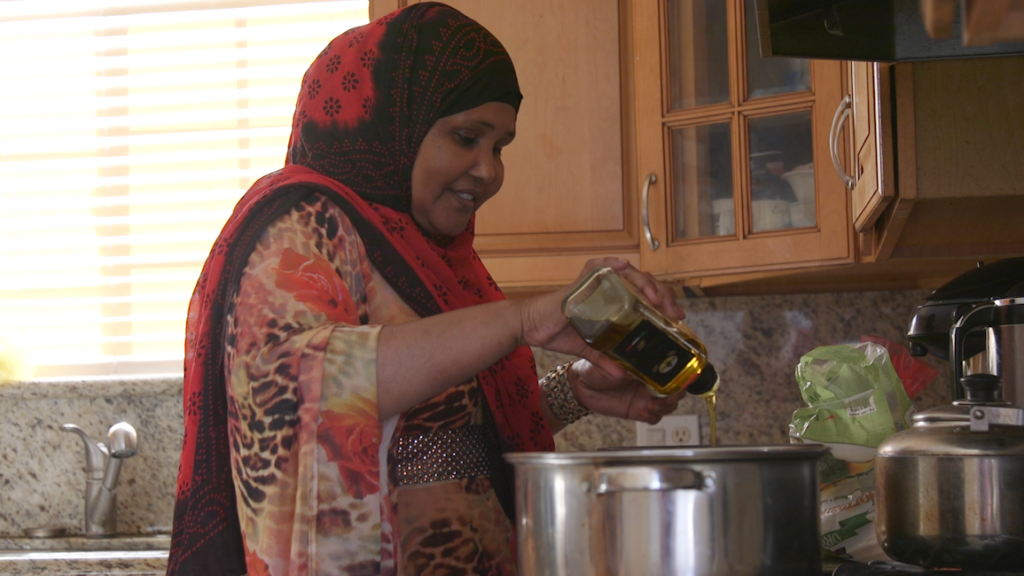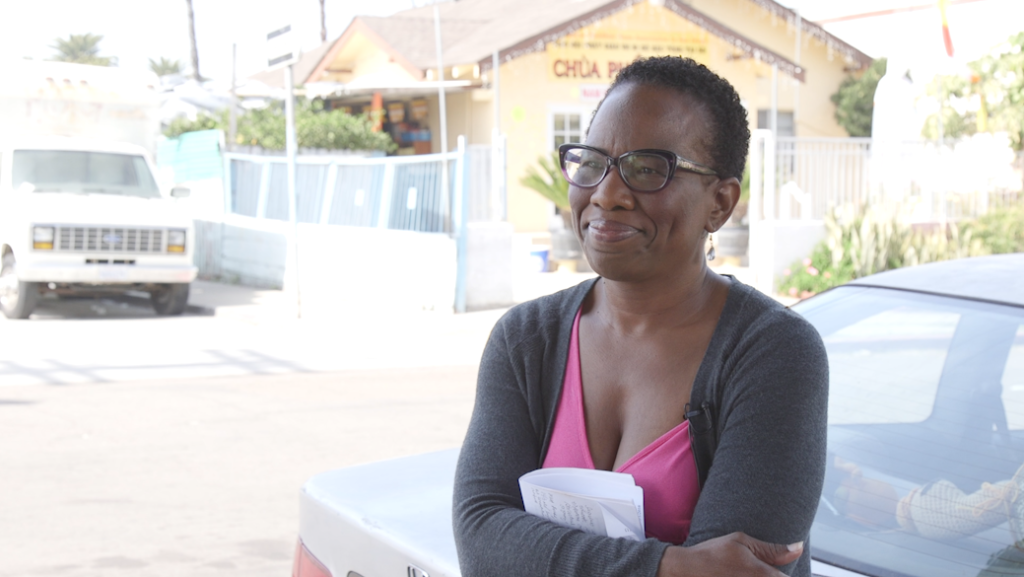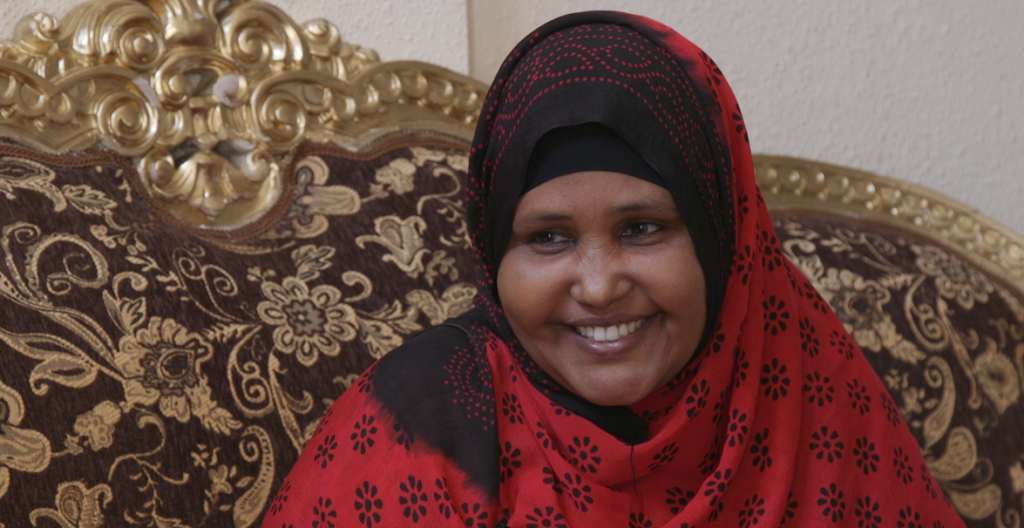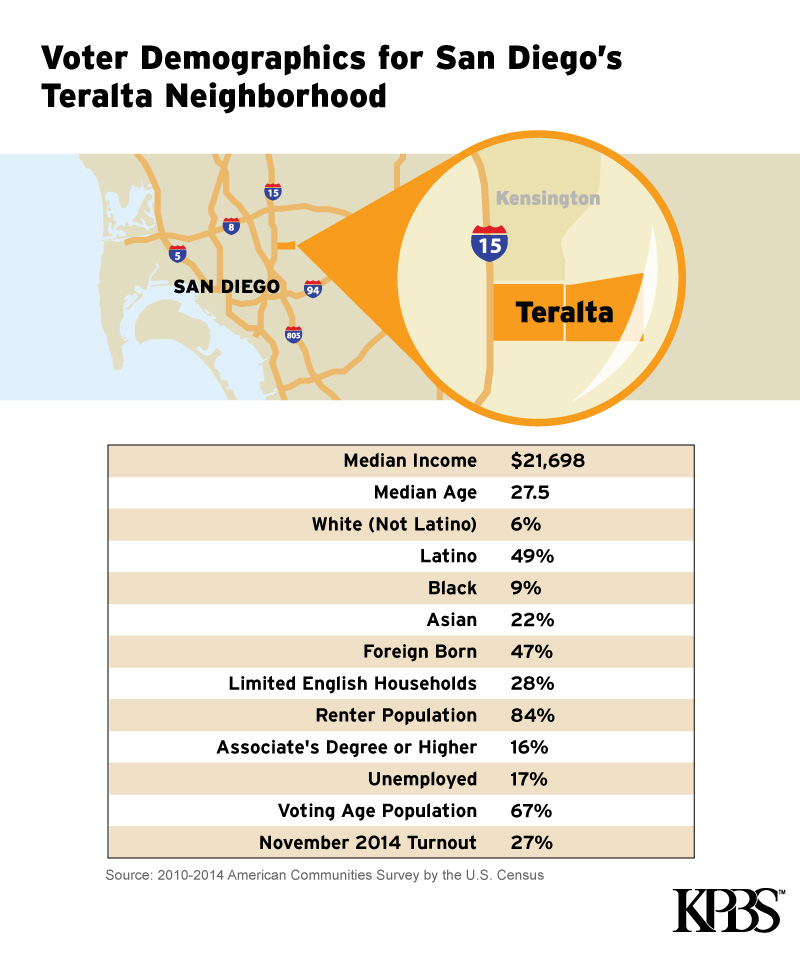 Mariam Ali, a Somali refugee who lives in San Diego’s Teralta neighborhood, pours olive oil into a pot for alfredo sauce, Feb. 26, 2016. | Photo Credit: Brian Myers, Media Arts Center San Diego
Mariam Ali, a Somali refugee who lives in San Diego’s Teralta neighborhood, pours olive oil into a pot for alfredo sauce, Feb. 26, 2016. | Photo Credit: Brian Myers, Media Arts Center San Diego
People up and down the state are trying to crack the code on California’s dismal voter turnout, which reached a record low for general elections in 2014. Just 42.2 percent of registered voters cast ballots.
Under a new law, the Department of Motor Vehicles is getting ready to automatically register drivers to vote, and there’s talk of sending mail-in ballots to every registered voter.
But a San Diego nonprofit, the Partnership for the Advancement of New Americans, sees untapped potential in one voting bloc: refugees. The group noticed that refugees who do vote, tend to never miss an election. They’re super voters.
How big is the opportunity? California has resettled about 300,000 refugees since the 1980s.
Ramla Sahid is PANA’s executive director and a U.S.-born daughter of Somali refugees.
“We grow, we have children, children get married, they have more children, so I think former refugees and new refugees are sort of an under-engaged, overlooked, potentially huge voter base that could, I think, impact the way we do things,” she said.
Sahid is working this election year to replicate on a larger scale what’s happening in Mariam Ali’s home. Ali lives in San Diego’s Teraltaneighborhood, where just 27 percent of registered voters cast ballots in the 2014 general election.
From war to ballot box
On a recent afternoon, Ali was cooking pasta for her children.
“My kids they love this stuff,” she said. “‘Mommy, make the alfredo sauce!’”
It’s the store-bought kind but spiked with curry and ground African peppers.
Twenty-five years ago, Ali was begging nomadic tribes for a pot to boil what little food she had. She and her family had fled civil war in Somalia and were walking to a refugee camp about 200 miles from their home.
|
“They took my house, they took my money, they took my belongings and I escaped with nothing,” Ali said. Rebels were seizing towns amid the fighting between Somalia’s Hawiye and Darod clans, the latter of which Ali’s family and ousted Somali President Mohamed Siad Barre were members.
Ali went from seeing a government toppled in Somalia to living for years in a Kenyan refugee camp with no civic structure — just United Nations workers keeping things running.
Today, in the United States, Ali is a super voter. That means she’s voted in every election since becoming a U.S. citizen in 2003. Her first vote for president went to Democrat John Kerry, who lost to Republican incumbent George W. Bush.
“I was like, ‘Oh, my god.’ We went to the county office and I didn’t know what to do,” Ali said, recalling that first vote.
Ali has since encouraged her three older sons to vote. She said they fill out their mail-in ballots as a family.
A small but mighty voting bloc
Most refugee families are not like Ali’s.
Statewide, about 32 percent of foreign-born residents vote, compared to 46 percent of those born in the U.S., according to data from the U.S. Census and Political Data Inc., a company that analyzes voter information for campaigns and others. Turnout among refugees is hard to pinpoint — foreign-born also includes people who voluntarily left home, immigrants who are living in the country illegally and cannot vote, and legal residents who aren’t yet citizens.
But a survey by PANA of 953 East Africans in San Diego shows 30 percent of those registered are super voters, or voted in at least eight of the past 10 elections. That’s compared to 20 percent of the state’s voting population, according to data from the U.S. Census and Political Data Inc.
Of the refugees surveyed, 75 percent are also active voters, meaning they don’t only show up for presidential elections like a lot of U.S.-born voters.
It’s unclear whether this phenomenon is seen elsewhere in the state. According to Political Data Inc., 13 percent of California’s foreign-born voters are super voters. The data doesn’t account for refugees alone.
But Sahid said it would make sense to see staunch refugee voters throughout the state.
“I think when you’re kicked out of your home, you’re persecuted, you’ve fled wars, and you have to start over and rebuild your entire life, it means something more when you can actually engage in decision-making,” Sahid said.
Ali said she votes because she wants her community’s needs addressed.
“It’s very important to vote because my voice will be heard,” Ali said. “If I need something and I don’t vote, who knows me? Who knows my needs? No one.”
Ali cares a lot about empowering women — her father pushed her into an abusive marriage at age 14. She said her vote in this year’s presidential race is going to Democrat Hillary Clinton.
“I am very excited,” Ali said. “Women can do what the men do, too.”
Ali said she also cares about rising college tuition and racial inequality. She said she’s surprised those issues don’t draw more U.S.-born voters to the polls.
“I want my community members to vote and come out of the shell that they (are) hiding in,” Ali said.
Casting doubt on ‘every vote counts’
 Noreen H. Green works for a San Diego nonprofit that promotes voting and social justice issues. She is standing across from a Buddhist nunnery in San Diego, March 1, 2016. | Photo Credit: Brian Myers, Media Arts Center San Diego
Noreen H. Green works for a San Diego nonprofit that promotes voting and social justice issues. She is standing across from a Buddhist nunnery in San Diego, March 1, 2016. | Photo Credit: Brian Myers, Media Arts Center San Diego
Noreen H. Green lives down the street from Ali. She said racial inequality is exactly why she hasn’t voted since the 1990s.
“I talk to refugees and they think this is the greatest country on Earth,” Green said. “I see it from a different perspective because I’m a black American and my ancestors were brought here as slaves and worked 400 years for free, and that’s how a lot of the wealth of this country was built. So I see it from that lens.”
Green comes from a family of super voters. In fact, the last time she went to the polls was in 2014 to drop off a ballot for her mother, who had a stroke that year and was paralyzed.
“It was that important to her,” she said.
Green’s husband is also a super voter. But not Green. She said casting a ballot would mean supporting a system she considers unjust.
“From young black men and women being killed — and there really have been no consequences for that — to the fact that you have to have millions, sometimes billions, to run for president. And our county Board of Supervisors sat on a huge reserve during the recession.” Green said. “I don’t vote because I don’t believe anyone deserves my vote.”
That includes whichever candidate squares off with Republican Donald Trump if he wins the nomination.
“That’s another thing. It’s like watching a circus,” Green said, referring to this year’s GOP presidential campaign.
Ironically, Green is interning with a nonprofit that works to get out the vote during election years. The San Diego Organizing Project also organizes the community around social justice issues.
Green said for her to vote, the system would have to look a lot different. And she said it will be those she organizes — the Black Lives Matter protesters, immigrant DREAMers and refugees like Ali — who will shape it.
“I think it’s important to empower people and create this mass of people that can make change,” Green said. “Because it’s going to take a mass movement.”
PANA believes refugees are that mass to push for change — at the ballot box. San Diego has resettled an estimated 100,000 refugees since 1975. To PANA, that’s 100,000 potential super voters.
Correction: The original version of this story said DMV is already registering drivers automatically to vote. That’s not happening yet; the New Motor Voter Act went into effect Jan. 1, but the state is still developing a system to handle DMV registration. The story has been updated.



